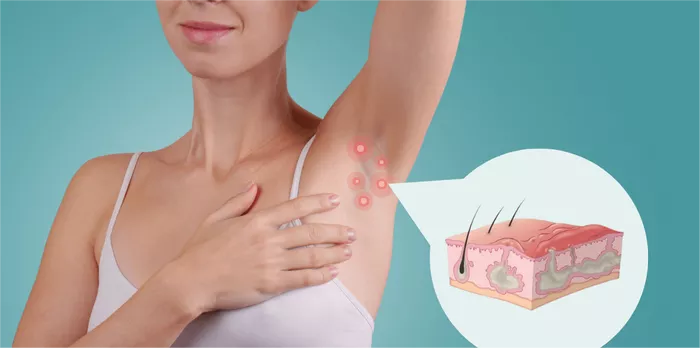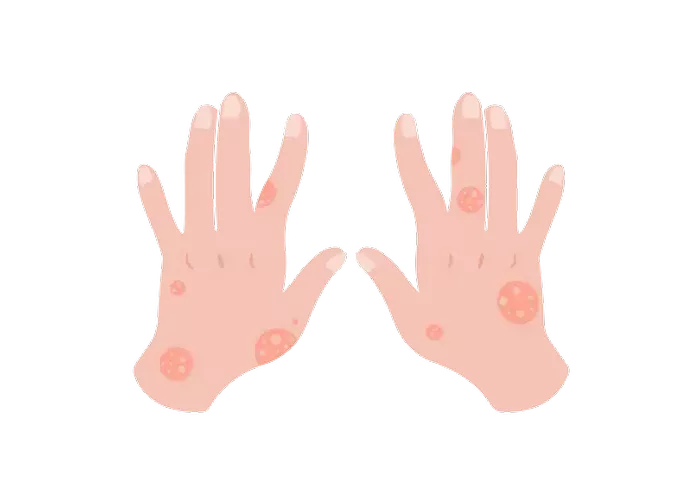Hidradenitis Suppurativa (HS) is a chronic skin condition characterized by painful lumps under the skin, primarily affecting areas where skin rubs together, such as the armpits, groin, buttocks, and breasts. These lumps can become inflamed, leading to abscesses, tunnels under the skin (sinus tracts), and scarring. The exact cause of HS is not fully understood, but it is believed to be related to inflammation of the hair follicles and sweat glands, possibly triggered by hormonal changes, immune system dysfunction, or genetic factors.
SEE ALSO: What Is Hidradenitis Suppurativa Boils?
Symptoms and Severity
The symptoms of HS vary in severity from person to person. In mild cases, patients may experience small, pimple-like bumps that heal on their own. However, more severe cases can involve large, painful nodules that rupture, leading to pus discharge and the formation of tunnels under the skin. Over time, these lesions can become chronic, leading to significant scarring and reduced quality of life. The severity of HS is typically classified into three stages (Hurley stages), ranging from mild (Stage I) to severe (Stage III).
Potential Complications
If left untreated, HS can lead to several complications, including:
Scarring: Repeated inflammation and infection can result in thick, fibrous scars that can restrict movement and cause disfigurement.
Infections: The open wounds from ruptured nodules can become infected, leading to cellulitis or abscesses.
Fistulas: Tunnels can form under the skin, connecting different areas of the body, which can be difficult to treat.
Psychological Impact: The chronic nature and physical manifestations of HS can lead to depression, anxiety, and social isolation.
Treatment Options
Lifestyle Modifications
While there is no cure for HS, certain lifestyle changes can help manage symptoms and prevent flare-ups:
Diet: Some studies suggest that a diet low in dairy and high in anti-inflammatory foods like fruits, vegetables, and omega-3 fatty acids may help reduce HS symptoms. Avoiding foods that trigger inflammation, such as processed foods, can also be beneficial.
Exercise and Weight Management: Maintaining a healthy weight can reduce skin friction and sweating, which may help prevent HS flare-ups. Regular physical activity also promotes overall well-being and stress reduction.
Stress Reduction: Stress is known to exacerbate HS symptoms. Practices like yoga, meditation, and mindfulness can help manage stress levels.
Hygiene Practices: Keeping the affected areas clean and dry is crucial in managing HS. Gentle cleansing with mild, non-comedogenic soaps and avoiding harsh scrubbing can prevent irritation.
Medical Treatments
For those with more severe symptoms, medical interventions may be necessary:
Topical Medications: Topical antibiotics, such as clindamycin, can be applied to the affected areas to reduce bacterial infection and inflammation.
Oral Antibiotics: For more widespread or severe cases, oral antibiotics may be prescribed to control infection and inflammation. Tetracyclines and rifampin are commonly used.
Biologics: These are newer treatments that target specific parts of the immune system to reduce inflammation. Biologics like adalimumab (Humira) have shown promise in treating moderate to severe HS.
Surgery: In some cases, surgical intervention may be required to remove abscesses, sinus tracts, or scar tissue. Options include incision and drainage, excision of the affected tissue, and laser therapy.
Home Remedies
In addition to medical treatments, some home remedies may provide relief for HS symptoms:
Warm Compresses: Applying warm compresses to the affected areas can help reduce pain and encourage drainage of pus.
Epsom Salt Baths: Soaking in a warm bath with Epsom salts can soothe inflamed skin and promote healing.
Tea Tree Oil: Known for its antibacterial properties, tea tree oil may help reduce inflammation and prevent infection. However, it should be used with caution and diluted properly, as it can cause irritation in some individuals. Always consult with a healthcare provider before using tea tree oil.
Seeking Professional Help
Importance of Early Diagnosis and Treatment
Early diagnosis and treatment of HS are crucial to preventing the progression of the disease and minimizing complications. If you suspect you have HS, it’s essential to seek medical attention promptly. A dermatologist or specialist can provide an accurate diagnosis and develop a personalized treatment plan tailored to your specific needs.
Finding a Dermatologist or Specialist
Consulting with a dermatologist who has experience in treating HS is recommended. They can offer the latest treatment options and provide ongoing care to manage the condition effectively. In some cases, a multidisciplinary approach involving surgeons, pain specialists, and mental health professionals may be necessary.
Emotional Support and Community
Living with HS can be challenging, both physically and emotionally. It’s essential to seek emotional support from friends, family, or a mental health professional. Counseling or therapy can help you cope with the psychological impact of the disease and develop strategies for managing stress and anxiety.
Online Communities and Support Groups
There are numerous online communities and support groups where individuals with HS can connect, share experiences, and offer support to one another. These platforms provide a sense of community and can be a valuable resource for information and encouragement.
Coping Strategies and Self-Care
Self-care is an important aspect of managing HS. Developing coping strategies, such as maintaining a regular skincare routine, engaging in stress-reducing activities, and prioritizing mental health, can improve your overall quality of life.
Conclusion
While HS is a chronic and challenging condition, there are various treatment options and support resources available to help manage symptoms and improve quality of life. By working closely with healthcare professionals and adopting a comprehensive approach that includes lifestyle changes, medical treatments, and emotional support, individuals with HS can find relief and regain control over their lives.
Related Topics:

























